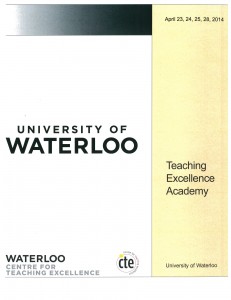It is moving and inspiring to see 250 colleagues gathered for a day of thinking and talking about teaching and learning. This year’s Teaching and Learning Conference took place on Thursday, April 30th, with over 200 people from the University of Waterloo and numerous colleagues from neighbouring universities participating in over forty research-based and practice-based sessions.
Vice-President, Academic and Provost, Ian Orchard, set the tone for the day: he opened the Conference by underscoring the value placed on teaching and developing as teachers at the University of Waterloo:
“The University of Waterloo values excellence in teaching, just as it does in research. […] Investing time in developing teachers is a vital aspect of fostering a culture that values teaching and learning and that develops teaching in a community environment. This conference helps foster community, and makes the sharing of teaching experiences possible, creating a community of scholars of teaching.”
The theme of this year’s Conference was “Making Teaching and Learning Visible.” There is indeed much about teaching and learning that remains unintentionally hidden and unspoken. And so, through this theme, we explored what we can do to clarify and communicate the processes underlying teaching and learning so that learners and teachers work towards the same outcomes. We explored challenging and provocative questions, such as “How do we know what students already know, what they don’t know, and what they have learned?” and “How can we make the thinking underlying our instructional decisions more explicit for ourselves, our students, and our colleagues?”. Each of the day’s panel discussions, workshops, and presentations attempted to reveal and communicate assumptions or practices in some way.
Presidents’ Colloquium Keynote Speaker, Dr. Linda Nilson, pursued this theme in her talk, “Making Your Students’ Learning Visible: How Can We Know What They Know?”. During this session, Linda delved into one of the most common yet challenging questions we have as teachers: How can we gather evidence of and measure student learning? She advocated for setting measurable learning outcomes in our courses, and for ensuring alignment between these outcomes, teaching and learning strategies, and assessment methods. Drawing on examples from across the disciplines, Linda provided concrete strategies for measuring and interpreting gains in student learning. If you’re intrigued by these ideas, you are welcome to download the slides and handouts from the keynote session, available through the Conference website.
A highlight of the Conference was the “Igniting Our Practice” session. Two inspiring and award-winning University of Waterloo professors, Gordon Stubley, Associate Dean, Teaching in Engineering, and Jonathan Witt, Teaching Fellow in Biology, each taught us a concept from their courses and, in doing so, drew us into the ways of thinking of their disciplines. Does the impressive display of feathers in the tail of the male peacock serve an evolutionary purpose? What do pre-tests reveal about fourth-year students’ knowledge of particular concepts in their third fluid dynamics course? Through vivid examples, Gordon and Jonathan led us to think about designing teaching for student learning, and how we might integrate these ideas into our own teaching.
The Conference closed with a wine and cheese reception where colleagues had the opportunity to connect over a drink and some food. Associate Vice President, Academic (AVP-A), Mario Coniglio closed the Conference, thanking people for their commitment to enhancing teaching and learning. He also took time to recognize the many people who had contributed to the Conference, including the participants and presenters, the Teaching Fellows, members of the Centre for Teaching Excellence (CTE), people who chaired sessions and provided technical support, Creative Services, as well as FAUW. At CTE, we’re particularly grateful for the vision and financial support AVP-A, Mario Coniglio, and Vice-President, Academic and Provost, Ian Orchard.
And now, it’s time to pursue the ideas that were sown at the Conference. And these actions have meaning and impact. As Ian Orchard said,
“All that you do as individuals allows students to be successful, allows teachers to be successful, and, if individuals are successful, the community is successful and therefore the University as a whole can be successful. Thank you for all you do.”
For details about this year’s Conference, please visit the Conference website. Planning for next year’s event has already begun!







